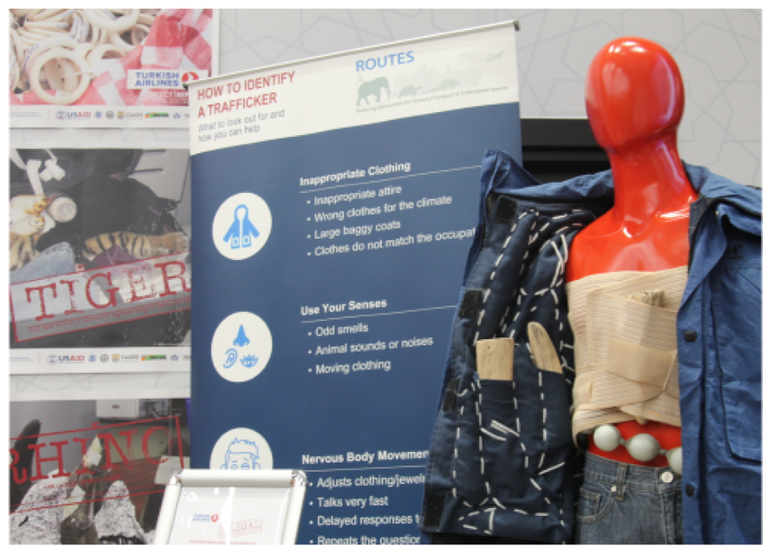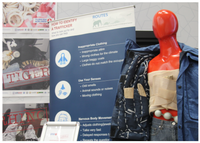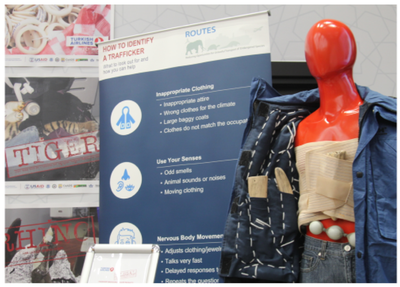ROUTES and Turkish Airlines install a life-size installation and host training for transport staff to learn how to detect and report wildlife trafficking
Jul 11, 2018

The training was conducted by the counter-trafficking organization Freeland as part of ROUTES. In addition to the workshop, Freeland provided awareness materials and set up a permanent wildlife trafficking awareness installation at the Turkish Aviation Academy. The new installation features a life-size mannequin, nicknamed ‘Smuggler Sam’ whose customized clothing, luggage, hidden strapping, compartments and pockets demonstrate ten ways air passengers attempt to conceal trafficked wildlife. Replica life-sized wildlife products such as ivory tusks, pangolin scales and rhino horns are a part of the permanent exhibit, for staff to look at and touch in order to be better prepared to detect it in a real scenarios. Customized posters, together with quick reference instruction manuals and instant report cards were provided to all staff.
“Air passenger trafficking attempts are growing at a concerning rate, but the majority of transport staff have not personally encountered it. Detection depends often on a split second judgment call,” said Josie Raine, Director at Freeland. “By knowing personally what pangolin scales look like or remembering what a jacket padded with hidden ivory feels like, and being able to recall this perhaps many months in the future, at the one moment when it matters, is critical. Meeting ‘Smuggler Sam’ is memorable experience and the kind of richly embedded learning that, together with comprehensive training, can make the difference between a successful detection or not.”
According to a recent ROUTES report analyzing wildlife trafficking in the air transport sector, Turkey serves as a significant transit point for poachers and traffickers supplying wildlife products from Africa to Asia.
The training in Turkey was part of a series of training workshops that ROUTES will conduct for airport and airline staff this year at key wildlife trafficking hubs across Africa and Asia. ROUTES recently conducted trainings in Malawi, Kenya, Malaysia, Mozambique, Singapore, and South Africa and over the next few months, ROUTES will hold additional training sessions in Ethiopia and Uganda.
For further information, contact:
Hallie Sacks
Email: Hallie.Sacks@traffic.org
About ROUTES
The USAID Reducing Opportunities for Unlawful Transport of Endangered Species (ROUTES) Partnership brings together government agencies, transportation and logistics industry companies and representatives, international conservation, development and law enforcement organizations and donors in order to disrupt wildlife trafficking activities, and forms a key element of the concerted international response to addressing wildlife poaching and associated criminal activities worldwide.
At the heart of ROUTES is a core group of partners collaborating with the U.S. Government and the transport sector that includes the Center for Advanced Defense Studies (C4ADS), Freeland, the International Air Transport Association (IATA), TRAFFIC and WWF. The Partnership is funded by USAID and coordinated by TRAFFIC. To learn more, visit routespartnership.org or follow @ROUTESPartners
About USAID
The United States Agency for International Development (USAID) is responsible for the majority of overseas development assistance from the United States Government and leads international development and humanitarian efforts to save lives, reduce poverty, strengthen democratic governance and help people on their journey to self-reliance. For more information please visit usaid.gov or follow @USAID on Facebook and Twitter.
About Freeland
Freeland is a frontline counter-trafficking organization working for a world that is free of wildlife trafficking and human slavery. Our team of law enforcement, development and communications specialists work alongside partners in Asia, Africa and the Americas to build capacity, change behavior, strengthen networks and promote good governance to protect critical ecosystems and vulnerable people. For more info, visit www.freeland.org also; follow Freeland on twitter @FREELANDpeople or www.facebook.com/freelandfoundation.


